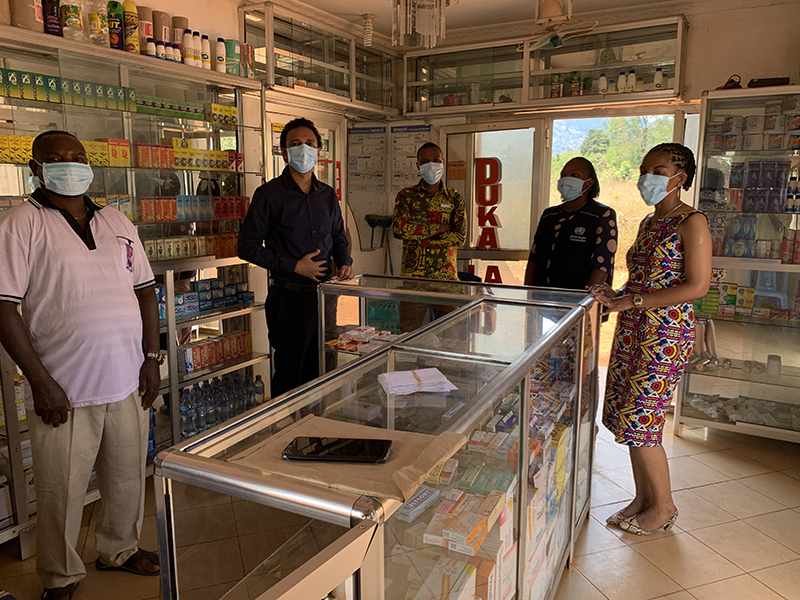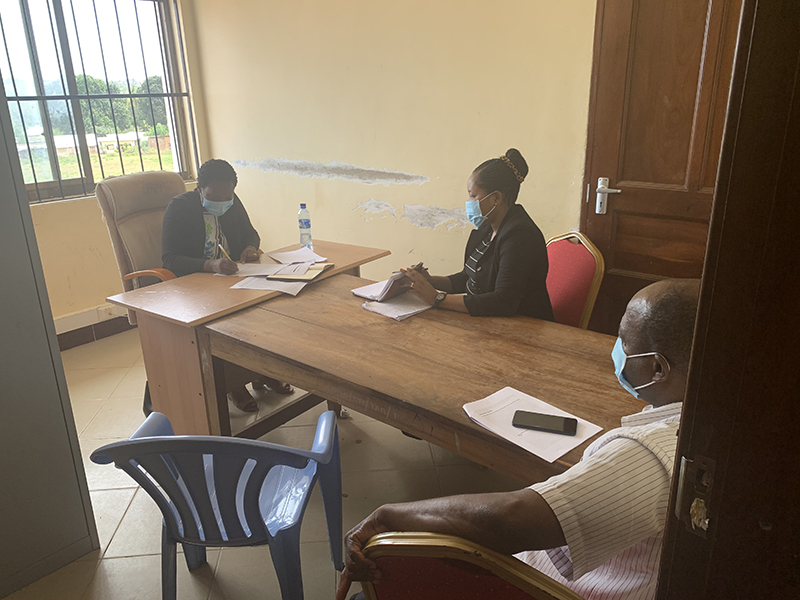A One CDC Response to COVID-19: Surveillance Support in Tanzania
On March 16th, 2020, the first COVID-19 case was reported in Tanzania. At the request of the Ministry of Health, Community Development, Gender, Elderly and Children (MoHCDGEC), the U.S. Centers for Disease Control and Prevention (CDC) and partners immediately engaged Rapid Response Teams (RRTs) at the national, regional, and district level. Using a “One CDC” approach, CDC leveraged existing programs to support targeted surveillance activities across the country.
Using an adaptive surveillance approach for Tanga Region

CDC staff visit a drug dispensary in Korogwe, Tanga to asses ADDO surveillance implementation and impact
In mid-April, the northern region of Tanga reported its first case of COVID-19. Tanga is a high-traffic region that shares land and water borders with Kenya, water borders with the islands of Zanzibar, and hosts numerous trans-Africa trucking routes. The increased movement of populations increases the risk for COVID-19 transmission in the region. CDC joined the Tanga Regional Health Management Team (RHMT) to assist with intensive, in-person surveillance.
To mitigate the spread of COVID-19 in the region, Tanga government officials mobilized regional and district RRTs. CDC staff trained RRTs on case investigation, contact tracing, home and community isolation, quarantine, infection prevention control (IPC), and case management. This preparation and proactive leadership by regional government officials provided a strong foundation for responding to the region’s first cases, as well as, implementing a new adaptive surveillance approach.
Over time, surveillance activities focused on containing cases in hotspot or cluster areas. Based on the COVID-19 community event-based surveillance (CEBS) strategy developed by MoHCDGEC with CDC support, Tanga regional authorities identified members from established community structures to be trained in alert notification, contact tracing, home isolation risk mitigation strategies, and community engagement.
To further identify potential cases of COVID-19 from community transmission, accredited drug dispensing outlet (ADDO) surveillance was implemented in select areas. Regional and district pharmacists recruited and trained drug dispensaries to monitor the number of people seeking advice or medication for COVID-19 symptoms. Monitoring changes in health-seeking behavior and notifying nearby health facilities to enhance screenings and IPC precautions prompted an increase in CEBS activities to detect suspected COVID-19 cases in the community. Finally, to provide ongoing field-based mentorship and technical oversight, the RHMT) engaged Tanga-based Field Epidemiology and Laboratory Training Program (FELTP) graduates. These “disease detectives” are the “boots on the ground” responders who help track, contain, and eliminate outbreaks. Ultimately, 116 healthcare providers and staff members were trained in various strategies, creating a holistic, community response to detect and respond to the COVID-19 crisis.

CDC staff discuss ongoing surveillance activities with FELTP officers in Tanga
Measuring impact and planning for the future
After several weeks of in-person technical support, the CDC team moved to virtual support with periodic in-person visits. To understand the potential contributions of these enhanced surveillance activities in mitigating COVID-19 risks, and the overall outbreak preparedness and response capacity in the region, CDC returned to Tanga, leading a joint mission with other key stakeholders to complete a rapid programmatic assessment in September 2020. The evaluators reached more than 80 of the participants with qualitative interviews, focus groups, and reviewed documents (e.g., alert registries) to assess impact. They concluded that RRTs were engaged per the guidance and that response teams worked to ensure CEBS was integrated across activities. The region still experienced a shortage of supplies. There were limited human resources to meet response needs, and a lack of efficient database management. After sharing the assessment findings with the RHMTs, regional officials were keen to leverage FELTP in a more meaningful and consistent manner to close the identified gaps.
The COVID-19 response in Tanga highlights the importance of relationships at local, national, and regional levels. Leveraging years of experience and expertise from across CDC Tanzania staff and programs, coupled with program investments, are essential factors in rapidly responding to current day public health challenges. These activities today help to create sustainable structures to proactively prepare for the challenges of tomorrow.